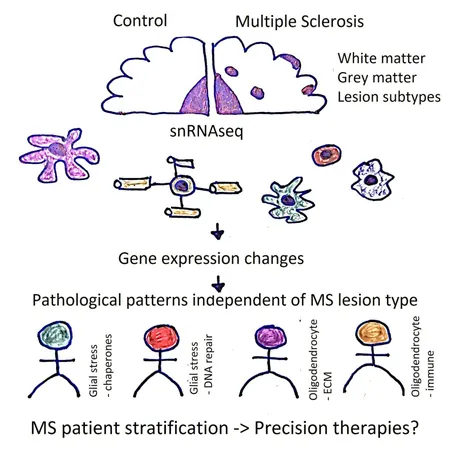
Revolutionary Brain Atlas Could Transform MS Treatments!
2024-12-20
Author: Nur
Revolutionary Brain Atlas Could Transform MS Treatments!
An international team of researchers, including notable scientists from Karolinska Institutet, has achieved a groundbreaking milestone by mapping the genes expressed in the brain cells of individuals suffering from multiple sclerosis (MS). This innovative atlas, published in the prestigious journal *Neuron*, aims to inspire a new wave of personalized therapies for MS patients in the future.
Multiple sclerosis is a chronic inflammatory condition that predominantly strikes individuals in their 30s and 40s, leading to a range of debilitating symptoms that can vary significantly from person to person. While existing treatments primarily target immune cells in the bloodstream to prevent them from inflicting damage upon the brain, their effectiveness wanes as the disease progresses. The urgent need now is to develop strategies that directly address the brain cells as well.
Despite its prevalence, the scientific community has struggled to comprehend the full impact of MS on brain cells over an individual’s life, and why some patients experience much more severe symptoms than others.
In a remarkable achievement, the collaborative research team—which includes experts from Edinburgh University and Hoffmann-La Roche in Basel—has constructed an "atlas of MS brain cells" with unprecedented detail, analyzing a record number of brains from deceased MS patients. This comprehensive study involved over half a million individual brain cells.
Unveiling Four Distinct Brain Cell Profiles
Armed with the data on gene expression within these brain cells, researchers successfully classified them into four unique groups characterized by distinct profiles.
Professor Gonçalo Castelo-Branco, a key figure in the study from Karolinska Institutet's Department of Medical Biochemistry and Biophysics, underscores the significance of these findings: "Each patient group exhibits different genetic signatures in their brain cells, implying they may respond variably to treatments. This discovery underscores the critical necessity for personalized MS therapies."
As it stands, the research has primarily utilized post-mortem brain tissue, paving the way for further investigations that could potentially lead to groundbreaking advancements in how MS is understood and treated.
What’s Next?
The implications of this research could be monumental. With a deeper understanding of how MS affects the brain at a cellular level, treatments can be tailored to individual genetic profiles, significantly enhancing the efficacy of interventions. The door is wide open for future studies that may focus on living patients, using this atlas as a foundational tool to explore brain health in real-time.
With advances like this on the horizon, the promise of personalized medicine for MS is inching closer, offering hope to millions. Are we on the brink of a new era in MS treatment? Stay tuned!




 Brasil (PT)
Brasil (PT)
 Canada (EN)
Canada (EN)
 Chile (ES)
Chile (ES)
 España (ES)
España (ES)
 France (FR)
France (FR)
 Hong Kong (EN)
Hong Kong (EN)
 Italia (IT)
Italia (IT)
 日本 (JA)
日本 (JA)
 Magyarország (HU)
Magyarország (HU)
 Norge (NO)
Norge (NO)
 Polska (PL)
Polska (PL)
 Schweiz (DE)
Schweiz (DE)
 Singapore (EN)
Singapore (EN)
 Sverige (SV)
Sverige (SV)
 Suomi (FI)
Suomi (FI)
 Türkiye (TR)
Türkiye (TR)